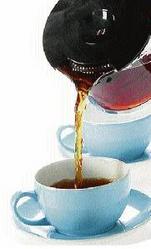
The most popular artificial sweetener found in our groceries, supermarkets, kitchens and restaurants and on our very dining tables is aspartame. It is marketed under trade names like NutraSweet or Equal.
In fact, you can't buy a stick of gum or a box of mints without being offered a dose of aspartame, and without reading the label like a hawk, you wouldn't know because it's not always obvious that a product contains aspartame. On most restaurant tables, right alongside the packets of white sugar, which is unhealthy in its own right, are pink and blue packets of NutraSweet and Equal, both of which contain known poisons called excitotoxins. Would you like some excitotoxins today?
Aspartame is a synthetic chemical composed of the amino acids phenylalanine and aspartic acid bonded with methyl alcohol. Methyl alcohol breaks down in the body to formic acid (the poison in ants' sting) and formaldehyde (embalming fluid). Each time you drink a diet soft drink or chew sugarless gum containing aspartame, you are feeding unhealthy doses of these substances into your system.
Alternating nervous system
The amino acids can go directly to the brain and alter the function of your nervous system. Your brain naturally contains phenylalanine, but phenylalanine in high concentrations is very unhealthy. Aspartame consumption provides phenylalanine in excess to your brain. Researchers know that a rise in brain phenylalanine levels ultimately increases the risk of seizures. The other chemicals mentioned above are also very toxic. They are all excitotoxins.
Poor control of diabetes, menstrual changes, thinning or loss of hair, poor weight control, low blood sugar, severe PMS.
Instead of a healthy dietary programme and exercise, people concerned with weight loss may use sugar-free foods sweetened with aspartame to reduce their calorie consumption. Unfortunately, aspartame is often associated with sugar cravings, overeating and weight gain!
Advertisements for aspartame portray it as a 'healthy' alternative to sugar. Such advertising makes aspartame even more dangerous to consumers who are ignorant of the artificial sweetener's potential side effects. Because of this deceptive advertising, people concerned about their health regularly use aspartame-sweetened products.
Some items that often contain aspartame:
Aspartame is everywhere. Montesano, its main manufacturer, has made a fortune from this chemical. Here is a list of common foods that often contain it:
Diet soft drinks, instant breakfasts, breath mints, cereals, sugar-free chewing gum, cocoa and coffee beverages, frozen desserts, gelatin desserts, juice beverages, laxatives, multivitamins, milk drinks, pharmaceuticals and supplements, no-sugar shake mixes, tabletop sweeteners, tea beverages, instant teas and coffees, topping mixes, wine coolers, yoghurt, children's vitamins.
Recommendations
Develop the habit to read carefully the ingredients list of everything you put in your mouth.
Be particularly careful of 'sugar-free' or 'sugarless' foods and beverages, especially diet soft drinks.
The newest of the artificial sweeteners is Splenda (sucralose). I do not feel that we have enough experience with Splenda to be totally confident of its safety although, "so far, so good".
I recommend the herb stevia as a sweetener to my patients. Known in South America as the 'sweet herb', stevia has been used for more than 400 years without ill effect. Stevia has been enormously popular in Japan, now rivalling NutraSweet, Equal and Sweet'N Low. It's 20 times sweeter than sugar, so a small portion of stevia goes a long way.
Email Dr Anthony Vendryes at vendryes@mac.com, log on to www.anounceofprevention.org or listen to 'An Ounce of Prevention' on Power 106FM on Fridays and Saturdays at 8:00 p.m.

Many instant teas and coffees have aspartame or other artificial sweeteners as ingredients. - File
Adverse reactions and side effects to aspartame
As far back as the 1980s, the Department of Health and Human Services in the United States received over 10,000 complaints regarding adverse reactions to aspartame. However, the enormous power of vested economic interests contrived to 'prove' that aspartame was perfectly safe. Despite all the complaints, the FDA accepted the proof.
One expert, Dr Janet Starr Hull, lists the following as some common side effects of aspartame use:
Nervous system problems
Epileptic seizures, headaches, migraines, severe dizziness, unsteadiness, memory loss, drowsiness and sleepiness, numbness of the limbs, slurring of speech, hyperactivity, restless legs, facial pain, tremors, attention deficit disorder, brain tumours.
Eye and ear disorders
Blindness, blurring or decreased vision, bright flashes, and decreased night vision, pain in one or both eyes, bulging eyes. Ringing or buzzing sounds, hearing impairment.
Psychological/psychiatric diseases
Depression, irritability, aggression, anxiety, personality changes, insomnia, phobias.
Chest
Palpitations, shortness of breath, high blood pressure
Intestinal
Nausea, diarrhoea, abdominal pain.
Skin and allergies
Itching, hives, aggravated res-piratory allergies such as asthma, hormonal and metabolic problems.

